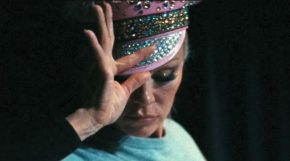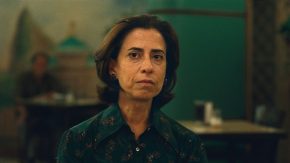In the darkest weeks of the year, in the run-up to Advent, even those who don’t often deal with transcendental issues tend to turn inwards, open to spiritual experiences. The Messiah and other renowned Advent classics are played in the venues, while Christmas sacred music, carols and psalms resonate with listeners. If they are religious, they can experience their faith more intensely through the power of music to evoke great emotions. But often even agnostic or atheistic music aficionados are moved to devotion.
“How great it must be to be religious!”
– I heard once at the gates of Müpa after the Christmas Oratorio by Bach.

Estonian Philharmonic Chamber Choir
An inescapable contemporary figure in sacred music, the works of the 87-year-old Estonian composer Arvo Pärt are also well known to Hungarian audiences. The composer has performed in Hungary before, and the last time I saw him was at the Müpa Budapest when the Festival Orchestra played his Te Deum in 2018. About Pärt, people everywhere say that he is like a holy man. It would be hard to argue with that. Reclusive and simple, he has the look, posture, hair, beard and gaze of a Renaissance saint: pure, infinitely simple and serene. He peels potatoes for recreation, he revealed in an interview with a journalist from Gramophone magazine. But what I noticed from watching him at the Müpa and reading his interviews is that Part is indeed a modern-day saint, but he is not at all pious or lacking in humour. His subtle sense of hilarité. At Müpa Budapest in 2018, for example, I saw him, when, at the loud questioning of the ladies in the box directly behind him (“Arvo Part,” one of them said loudly, “who is that?”), his eyes twinkled in amusement and he smiled gently.
Now his works, which radiate infinite serenity, sublimity and simple purity, are once again being performed at Müpa Budapest. The Estonian Philharmonic Choir will perform the Magnificat, the Berlin Mass and the Christmas Cradle Song on the first Sunday of Advent, 27 November at the Béla Bartók National Concert Hall. For Pärt, whose art is often referred to as “sacred minimalism” or “mystical modernism”, silence is as important as the music itself.
“Silence is the moment when I’m closest to God”
– he said. For him, music is simply what surrounds silence. Silence is the main point, the beginning and the end.
“Silence can be both that which is outside of us and that which is inside a person. The silence of our soul, which isn’t even affected by external distractions, is actually more crucial but more difficult to achieve”
– he said in an interview to NFR.
Arvo Part was born in Estonia in 1935. He grew up under the Stalinist dictatorship and studied composition with the legendary composer H Eller. He first wrote serialist music: in 1961, he composed Mailma sam, perhaps the most famous piece of the Estonian serialism, from which he has since more or less dissociated himself.
“My pieces are like my children – I would never disown them but am a bit worried about some of the early peaces.”
The Soviet authorities considered serial music to be secular and decadent, and the decision-makers in the strictly centralised music scene did not look kindly on Part’s art. Moreover, many of his composers were already openly religious – another bad thing in Stalin’s era. So for years he could only find work in the radio and film industries, while at home he continued to compose frantically, and for a long time his works failed to find an audience. He turned away from serialist music in the late 1960s and began to study medieval church music. In 1976, he created his own style, which he called “tintinnabuli” after the Latin word tinnullus (ringing sound), and which still characterises his art today.
After emigrating from Estonia in 1980, Part lived in Berlin from 1982 to 2010. Today, Estonia is his home again and he is one of his country’s most famous figures. His fanbase is wide: Björk, Nick Cave and Rufus Wainwright, but he has also influenced Norwegian metal bands, and the Icelandic group Sigur Ros regularly plays his meditative, tintinnabuli-style piano piece Für Alina before his concerts.
The thought-provoking, highly influential, sacred yet deeply spiritual art of Part is brought to Hungary by his compatriots conducted by Tőnu Kaljuste. Part’s works will form the backbone of the Advent concert, but they will be joined by works by four other Nordic composers. In addition to sacred pieces by Nyedt, Sibelius, Maasalo and Kreek, Kodály’s Laudes Organi will also be performed.
Article: Zsuzsanna Deák
Translation: Nóra Fehér



























Comments